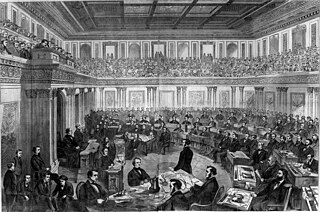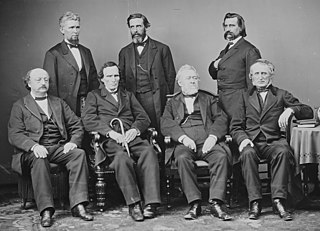Other countries
| | This section is empty. You can help by adding to it. (December 2022) |
An article of impeachment is a documented statement which specifies the charges to be tried in an impeachment trial as a basis for removing an officeholder. [1] Articles of impeachment are an aspect of impeachment processes of many governments that utilize a bifurcated (two-part) impeachment process that sees a vote to "impeach" followed by an impeachment trial on whether to remove an officer.
In an impeachment trial, an article of impeachment serves the same role that an indictment would in a criminal trial. [1] [2] Articles of impeachment are adopted prior to an impeachment trial by the legislative body with authority to invoke the impeachment that triggers the trial. In the trial, the accused party generally attempts to counter the elements of the article(s) of impeachment through arguments. [1]
In the United States federal government impeachments, the articles of impeachment are adopted by the United States House of Representatives. [1] After the articles are sent to the United States Senate, the Senate holds an impeachment trial on the charges of the article, sitting as the "High Court of Impeachment". [3]
An article of impeachment may be preceded by a separate article first declaring an impeachment. In such an instance, an official is already impeached and pending a trial even before the adoption of any articles to provide specific charges to be tried on. This was standard practice in the 19th century. [4] Alternatively, in more modern impeachment, article(s) of impeachment are instead directly adopted without any such preceding impeachment resolution, in which case the first article of impeachment to be adopted is what officially impeaches the official. [5]
In the past, proposed articles have both been first approved by a committee or have gone to a direct floor vote without committee approval. In order for any article of impeachment to advance from a committee to a full vote of the House, a simple majority vote of the committee is typically needed so that the committee can forward the article. A committee may forward multiple articles, with each one usually requiring a separate vote of the committee. [6] Often articles are created by a committee that has been tasked with running an impeachment inquiry. In this instance, they are typically considered in a meeting called a "markup". [7]
After the House has approved articles of impeachment by a simple majority, the United States Senate will be presented with the matter, leading to an impeachment trial. [5] [8]
Articles of impeachment have also been used in impeachment at the state level.
Many tribal governments have impeachment processes, [9] some of which make use of articles of impeachment. [10]
Articles of impeachment are utilized in the impeachment process of the Philippines. [11]
When impeachment was a practice in the United Kingdom, articles of impeachment were, by convention, utilized in the impeachment process. [12]
| | This section is empty. You can help by adding to it. (December 2022) |

Impeachment is a process by which a legislative body or other legally constituted tribunal initiates charges against a public official for misconduct. It may be understood as a unique process involving both political and legal elements.

In the United States, impeachment is the process by which a legislature may bring charges against an officeholder for misconduct alleged to have been committed with a penalty of removal. Impeachment may also occur at the state level if the state or commonwealth has provisions for it under its constitution. Impeachment might also occur with tribal governments as well as at the local level of government.

The impeachment of Andrew Johnson was initiated on February 24, 1868, when the United States House of Representatives passed a resolution to impeach Andrew Johnson, the 17th president of the United States, for "high crimes and misdemeanors". The alleged high crimes and misdemeanors were afterwards specified in eleven articles of impeachment adopted by the House on March 2 and 3, 1868. The primary charge against Johnson was that he had violated the Tenure of Office Act. Specifically, that he had acted to remove Edwin Stanton from the position of Secretary of War and to replace him with Brevet Major General Lorenzo Thomas as secretary of war ad interim. The Tenure of Office Act had been passed by Congress in March 1867 over Johnson's veto with the primary intent of protecting Stanton from being fired without the Senate's consent. Stanton often sided with the Radical Republican faction and had a good relationship with Johnson.
An impeachment trial is a trial that functions as a component of an impeachment. Several governments utilize impeachment trials as a part of their processes for impeachment, but differ as to when in the impeachment process trials take place and how such trials are held.

The impeachment trial of Andrew Johnson, 17th president of the United States, was held in the United States Senate and concluded with acquittal on three of eleven charges before adjourning sine die without a verdict on the remaining charges. It was the first impeachment trial of a U.S. president and was the sixth federal impeachment trial in U.S. history. The trial began March 5, 1868, and adjourned on May 26.

During his presidency, Andrew Johnson, the 17th president of the United States, saw multiple efforts during his presidency to impeach him, culminating in his formal impeachment on February 24, 1868, which was followed by a Senate impeachment trial in which he was acquitted by one vote.
The first impeachment inquiry against Andrew Johnson was launched by a vote of the United States House of Representatives on January 7, 1867, to investigate the potential impeachment of the President of the United States, Andrew Johnson. It was run by the House Committee on the Judiciary.
The second impeachment inquiry against Andrew Johnson was an impeachment inquiry against United States President Andrew Johnson. It followed a previous inquiry in 1867. The second inquiry, unlike the first, was run by the House Select Committee on Reconstruction. The second inquiry ran from its authorization on January 27, 1868, until the House Select Committee on Reconstruction reported to Congress on February 22, 1868.
An impeachment investigation is an investigation or inquiry which takes place in relation to an impeachment or potential impeachment.

In the United States, an impeachment inquiry is an investigation or inquiry which usually occurs before a potential impeachment vote.
Samuel Chase, an associate justice of the Supreme Court of the United States, was impeached by the United States House of Representatives on March 12, 1804 on eight articles of impeachment alleging misconduct. His impeachment trial before the United States Senate delivered an acquittal on March 1, 1805, with none of the eight articles receiving the two-thirds majority needed for a conviction.

On May 16, 1868, the United States House of Representatives authorized the impeachment managers (prosecutors) of the impeachment trial of Andrew Johnson to conduct into possible "improper or corrupt means" to influence the vote of members of the United States Senate in the impeachment trial. The investigation was launched before the adjournment of the trial and continued after the trial adjourned on May 26, 1868. The leading figure of the investigation was Benjamin Butler. The final report of the investigation was published on July 3, 1868.
The Command of Army Act is a law that was in effect under the 1867–1868 appropriations act for the United States Army. The appropriations act under which the law was in place had been passed by the United States Congress on March 2, 1867, and signed by President Andrew Johnson on March 4, 1867. It was one of several pieces of legislation that the United States Congress passed to curb the powers of Andrew Johnson as president of the United States. The Congress' efforts to curb Johnson's powers was motivated by tensions over reconstruction, with Johnson being regarded as an obstructor of the Republican supermajority-led Congress' designs for reconstruction, especially those sought by the Republican Party's "Radical Republican" faction.

Andrew Johnson became the first president of the United States to be impeached by the United States House of Representatives on February 24, 1868 after he acted to dismiss Edwin Stanton as secretary of war in disregard for the Tenure of Office Act.
Eleven articles of impeachment against United States President Andrew Johnson were adopted by the United States House of Representatives on March 2 and 3, 1868 as part of the impeachment of Johnson. An impeachment resolution had previously been adopted by the House on February 24, 1868. Each of the articles were a separate charge which Johnson would be tried for in his subsequent impeachment trial before the United States Senate.

In the United States, a federal impeachment trial is held as the second stage of the United States federal government's bifurcated (two-stage) impeachment process. The preceding stage is the "impeachment" itself, held by a vote in the United States House of Representatives. Federal impeachment trials are held in the United States Senate, with the senators acting as the jurors. At the end of a completed impeachment trial, the U.S. Senate delivers a verdict. A "guilty" verdict has the effect of immediately removing an officeholder from office. After, and only after, a "guilty" verdict, the Senate has the option of additionally barring the official from ever holding federal office again, which can be done by a simple-majority vote.

In the United States, federal impeachment is the process by which the House of Representatives charges the president, vice president, or another civil federal officer for alleged misconduct. The House can impeach an individual with a simple majority of the present members or other criteria adopted by the House according to Article One, Section 2, Clause 5 of the U.S. Constitution.